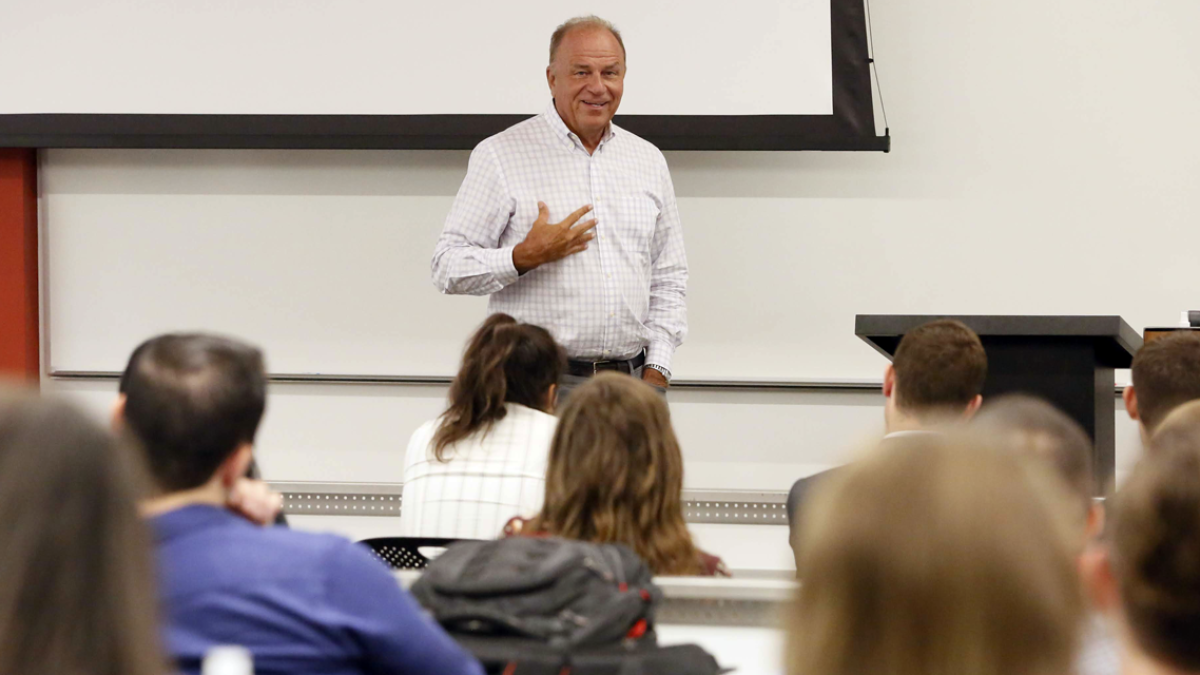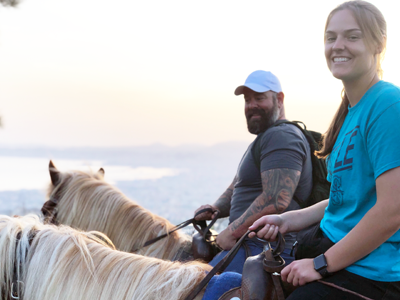It's amore: ASU Law taps former Attorney General Grant Woods to teach in its Italy program

Grant Woods, former Arizona attorney general and John McCain’s chief of staff, speaks to ASU Law students.
A political career in which he served as Arizona’s attorney general and John McCain’s chief of staff has taken Grant Woods all over the world. And in all his travels, the city he connected with the most was Florence, Italy.
It was serendipity when Douglas Sylvester, dean of the Sandra Day O’Connor College of Law at Arizona State University, approached the ASU Law alum about teaching a program overseas, in nearby Prato.
“Dean Sylvester first talked to me about it several years ago,” Woods said. “He was very enthusiastic about this new program, but he was kind of talking in generalities and hadn’t gotten to where it was. And then he said ‘Italy.’ And I said, ‘Great — where at in Italy?’ And he said ‘Florence.’ I said, ‘Great.’ And he said, ‘I’ll give you the details so you can think about it.’ And I said, ‘No. You can give me the details, but I don’t need to think about it. You just named my favorite city in the world, so I’m in.'
“Not that I wouldn’t have done it if it was in Florence, Arizona,” Woods said with a laugh. “But when it was Florence, Italy, I said, ‘OK, that’ll work.’”
Woods recently returned from his third summer teaching in the program. He said the schedule — three-hour classes three times a week over a four-week block — is demanding, but working with students while enjoying the culture and scenic beauty of Italy makes it all worthwhile.
“It's a lot of work, so it makes me appreciate the law professors all the more,” Woods said. “But it's been a great experience. The students really give me a lot of hope for the future and hope for the profession. They help remind you of why you got involved in the legal profession in the first place.”
The program was launched through a partnership with Monash Law School of Melbourne, Australia, which has a campus in Prato. Students pay ASU tuition and earn ASU credits for the courses, which are taught in English and cover such topics as international refugee law, international criminal justice, comparative European legal systems, sovereignty and globalization and European Union external relations.
Diana Bowman, who oversees the program as ASU Law’s associate dean for international engagement, says it not only provides a rich cultural and intellectual experience for students, but allows them to build a global network of colleagues that can serve as an invaluable resource throughout their career.
Bowman says she is honored to have Woods among the rotating staff of instructors, noting that he has been a great ambassador for the program, and ASU Law more generally, and his willingness to take part is a testament to how special the program is.
Woods says it’s an amazing opportunity for students — one he wishes he had when he was attending ASU Law. His most recent class included students from Australia, Canada, France, Germany, India, Israel, Italy, Taiwan and the United States.
“Any student who has any interest in traveling abroad would be crazy not to participate in the program. I mean, if you had to choose some place to go, I don’t know why you wouldn’t go to Prato,” he said. “You also are exposed to students from all around the world. And that's different than sitting in your normal law school class here in Phoenix.”
Student experiences
Like Woods, Joshua Abbott has been all over the world. A Master of Legal Studies student at ASU Law, Abbott is an Army veteran who has worked in intelligence and special operations. He has been to over 40 countries, mostly in Europe and Africa. So when he saw the chance to take a comparative criminal law class from Woods, in Prato, there was no hesitation.

Master of Legal Studies student Josh Abbott partakes in a horseback ride up Mount Vesuvius in Campania, Italy, with friend Rylee Payton.
“I always thought you better know the laws around the places you’re going to visit, and I’ve visited quite a few,” Abbott said, recalling the high-profile case of Michael Fay, an American teenager who, in 1994, was sentenced by the Singapore government to several lashes with a cane for theft and vandalism. “So comparative criminal law is interesting to me, and Grant Woods is the former Arizona attorney general and worked with John McCain, and I’d heard him speak several times, so I knew I liked him.”
He said Woods facilitated thought-provoking discussions, detailing U.S. policies and calling upon international students to weigh in on how their countries’ laws compared.
“He made it very interactive with the fellow students,” Abbott said. “And there was more of a moral and ethical element to it than I expected, which I greatly appreciated. He would tailor questions to make for morally difficult answers.”
Kelsey Misseldine did not have a chance to take Woods’ class, but attended the summer’s first session in Prato, studying international economic law. She was looking to get away from Phoenix after a rigorous first year of law school, and the chance to study in Italy seemed like a once-in-a-lifetime opportunity.
“My experience in Prato was incredible,” she said. “Academically, I appreciated the perspectives that were posed in our class due to the differing national origins. And culturally, what is there to not like about Italy? Pizza, pasta, history, architecture. Each day I was in awe at the new places I was able to visit and appreciate a country with a history much longer than the U.S.”
During her time in Italy, she took the Write-On Exam that qualifies students to join the Arizona State Law Journal. Although it’s a difficult test, she has fond memories of taking it while on a balcony overlooking Prato, eating pizza and croissants.
Pizza, coincidentally, is what lured Dylan Mileusnich to Prato. Free pizza, that is.
“I was drawn to the Prato program at first by the offer of free pizza at the informational meeting,” he said. “I have always wanted to travel, and I didn't know when the next time I would have time to do so would be, so I applied, got the class I wanted, and the rest is history.”
Now a second-year student at ASU Law, Mileusnich signed up for a class in Prato examining the portrayal of the law and lawyers in fiction. He was the lone American in a class of 35 students.
“As the only American, it was interesting to see how my perspective was different from the others’, especially since pieces from American pop culture were the focus of the class.”
To make their experience even more meaningful, all students in the program are encouraged to take advantage of their off days and explore their surroundings.
“I enjoyed every minute of the trip,” Misseldine said. “Once you immerse yourself into the culture and begin to explore all the historic sites, gardens and museums, each day becomes a new adventure.”
She said a 13th-century castle sits just one block from the Prato campus, nestled among apartments and everyday buildings. It gave her new perspective, coming from Arizona, where anything built in the early 1900s is designated historic. She traveled throughout the country and beyond, visiting Belgium and the Netherlands. Rome, she said, was a particularly profound experience.
“It was incredible to walk the streets and realize that Romans get to walk past the Forum and Colosseum daily, as just a normal sight,” she said. “It made me appreciate my own history more and sparked my travel bug to want to explore so much more in the future.”
Abbott’s European travels had never taken him to Prato before. Although it’s a relatively small city, he said it has much to offer.
“It's a cool little city,” he said. “Great food, great atmosphere, great culture. It’s got wine, cheese shops, pastry shops, panini places. All the things that we pay extra for here because, you know, it’s authentic. Well, it’s authentic and it’s cheap right there.”
Mileusnich describes it as “a very small big city.”
“There are a lot of big, beautiful buildings and there is a lot to do but, at the same time, everything is in walking distance,” he said.
And there is so much to see beyond the city.
“One weekend I took a train to Pisa; on another I went to Florence, which is very close to Prato,” he said. “I also went to Cinque Terre, Rome, the Vatican, and I even popped over to Athens.”
Opportunity of a lifetime
Any student with the opportunity to take part in the program should, Misseline said. And her only regret is that she didn’t lengthen her stay.
“I would recommend attending two sessions,” she said. “I feel like I had just become comfortable in Prato after one month, and there was so much more I could have explored with additional time.”
Abbott says the benefits of studying abroad go far beyond what is learned in the classroom.
“You may learn something that you didn't know in the class, but it’s short, it’s condensed. You may not learn as much as you would in a full semester of sitting in a classroom,” he said. “But the experiences that you have abroad, meeting new people, taking in a new culture, that's really where you win in these situations. If you have the opportunity to do it, don't let it pass you by.”
Woods says he would have jumped at the opportunity, had such a program existed when he was attending ASU Law in the 1970s.
“Prato has a very dynamic atmosphere, filled with young people,” he said. “It’s the classic Italian village, but it’s very vibrant. And you hop on the train and within minutes, you’re in Florence, which is one of the greatest cities in the world. And students make a point of traveling to other parts of Italy and France and wherever they wanted to go, because everything is so close.”
Although he values the education and experiences from his time at ASU Law, Woods says the Prato program is one of the many exciting options that have developed for students in the years since, as the school has bolstered its curriculum, expanded its international reach and come to offer so much more.
“You don’t get a chance to go live in Florence, Italy, and get some law school credits and have some fun along the way too often in life,” he said. “That's not always true at law school. But it’s certainly true in ASU Law’s Prato program. I really encourage people to take advantage of it. It's an amazing opportunity, and they will never forget it.”
This is just one of the many experiences offered through the ASU Study Abroad Office, which has 250-plus programs in more than 65 different countries.
More Law, journalism and politics

'Politics Beyond the Aisle' series to explore the stories of public officials
In an effort to build a stronger connection between students and political and civic leaders, Arizona State University’s School…

ASU committed to advancing free speech
A core pillar of democracy and our concept as a nation has always been freedom — that includes freedom of speech. But what does…

ASU experts share insights on gender equality across the globe
International Women’s Day has its roots in the American labor movement. In 1908, 15,000 women in New York City marched to protest…